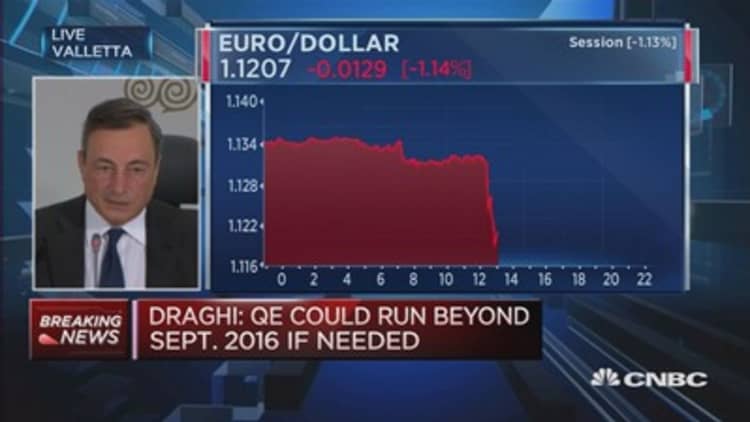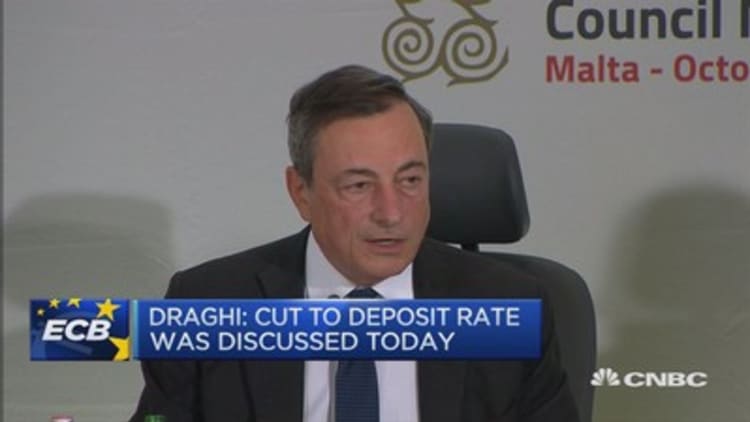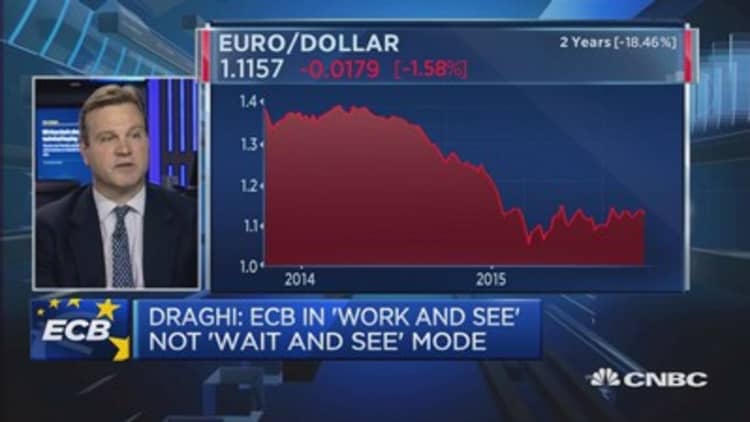



European Central Bank president Mario Draghi has suggested that the euro zone's trillion-euro bond-buying program will need to be "re-examined in December" as inflation remains stubbornly low amid emerging market weakness.
Draghi said the strength and persistence of factors slowing inflation require "thorough analysis" as he reiterated the central bank's commitment to use all measures available to it to tackle the lackluster growth seen in the euro zone.
"The asset-purchase plans are proceeding smoothly and continue to have a favorable impact," ECB President Mario Draghi said at a news conference in Malta.
But worries about the strength of emerging market economies and the volatility seen in commodity prices mean the "degree of policy accommodation will need to be re-examined in December," he said. This was widely seen as an indication that the bank's one trillion euro ($1.1 trillion) quantitative easing (QE) program will either be expanded or extended beyond its original September 2016 deadline.
"All eyes are now on the 3 December ECB meeting, when inflation forecasts for 2016 and 2017 are also released. If the 2017 forecast is revised down to around 1.5 percent, there is a strong argument for further easing of monetary policy," said head of euro zone sovereign rates at Aviva investors, Geoffroy Lenoir.
"Options in those circumstances include extending the duration of QE beyond September 2016 or raising the ceiling for asset purchases, which is already very high at 60 billion euros. Extending QE is the more likely of the two," he added.
The euro slumped to a three-week low against the dollar, falling around 1.3 percent to $1.11 below after Draghi said the ECB was open to a "whole menu" of policy instruments.
Draghi highlighted the challenges that emerging market economies were facing, specifically mentioning China as a key external headwind to the stability of the euro area.
"As it happens, we doubt that the risk from emerging markets is too serious," said senior European economist at Capital Economics, Jennifer McKeown.
"Nonetheless signs of a slowdown in the domestic economy and the continued absence of inflationary pressure warrants stronger policy support. We have penciled in an increase in the monthly pace of asset purchases from 60 billion euros to 80 billion euros, to be announced after the next meeting on 3rd December," she said.
Draghi's comments come after the European Central Bank left its key interest rates unchanged at record lows on Thursday.
The 25-member Governing Council kept the main refinancing rate at 0.05 percent at its meeting in Malta, rather than the regular policy meeting venue of the headquarters in Frankfurt.
The rate on overnight deposits also remained at -0.2 percent, meaning banks have to pay to park their deposits wit the ECB. The marginal lending rate also stayed the same at 0.3 percent.
The massive QE program was launched in March this year to help push inflation back towards the targeted 2 percent level and boost liquidity in the 19-country euro zone.
However, bank lending remains low and prices in the euro area fell by an average of 0.1 percent in September. Growth remains uneven, with the economies of Italy, Greece, Finland and Austria seen expanding by less than 1 percent this year.




